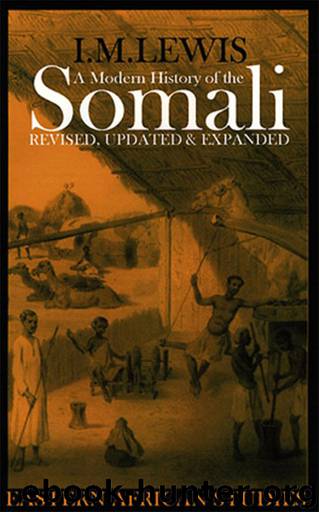A Modern History of the Somali: Nation and State in the Horn of Africa (Eastern African Studies) by I.M. Lewis & I. M. Lewis

Author:I.M. Lewis & I. M. Lewis [Lewis, I.M.]
Language: eng
Format: mobi
Publisher: Ohio University Press
Published: 2003-03-17T05:00:00+00:00
CHAPTER IX
THE SOMALI REVOLUTION: 1969–76
The military coup
THE ELECTIONS WHICH had brought the S.Y.L. to power with such overwhelming authority had left a bitter legacy of discontent. Although, at constituency level, rival lineage segments had hedged their bets by supporting several candidates under different party banners, many had not succeeded in returning a trusted representative to Mogadishu. Many of the unsuccessful candidates who had invested so heavily in the campaign were powerful, ambitious people and the conduct of the elections encouraged them to bring forward a large number of electoral petitions and complaints to the courts. The government’s answer was provided by the Supreme Court which, contrary to previous decisions, now ruled that it was not empowered to judge such issues. This naturally increased the frustration felt by many of those who had not gained a seat in the Assembly. At the same time, although the S.Y.L. monopolized the Assembly, their very numbers greatly exacerbated the normal problems of party discipline. This encouraged Igal’s government to rely even more heavily than its predecessors on the funds at its disposal1. Opponents and critics outside the Assembly were consequently able to complain even more bitterly of the corruption and nepotism which they considered now prevailed at all levels of government.
This sense of discontent and frustration was by no means limited only to members of the westernized elite. The democratic parliamentary process which had seemed to blend so well with traditional Somali political institutions and had begun with such verve and promise, had turned distinctly sour. The National Assembly was no longer the symbol of free speech and fair play for all citizens. It was now widely regarded cynically as a sordid market-place where, with little concern for the interests of those who had voted for them, deputies traded their votes for personal gain. Deputies were ferried about in sumptuous limousines, bearing the magic registration letters A.N. (Assembled Nazionale) which the inveterate poor of the capital translated with grim humour as anna nolahay: ‘I’m all right, Jack’. A story popular in Mogadishu epitomizing the gulf between rulers and ruled referred to an incident in which one man riding on another’s back and making the motions of driving a vehicle was stopped by a puzzled guard at the entrance to Government Headquarters (Governo). ‘What do you think you are doing?’ challenged the guard. ‘Oh’, replied the man riding his human mount, ‘I noticed that in order to get in here you had to be conducted by a chauffeur.’ In the opinion of the more disillusioned critics, democracy had lapsed into commercialized anarchy and strong rule of a new type was urgently required if the country was to be rescued from the morass of poverty, insecurity and inefficiency into which it had sunk.2 Premier Igal and President ‘Abd ar-Rashid seemed supremely unconcerned by these danger signals and their only acknowledgement of them was to adopt a dangerously high-handed and authoritarian style of rule which added to their unpopularity. Rumours of military intervention were rife and, amongst
Download
This site does not store any files on its server. We only index and link to content provided by other sites. Please contact the content providers to delete copyright contents if any and email us, we'll remove relevant links or contents immediately.
| Africa | Americas |
| Arctic & Antarctica | Asia |
| Australia & Oceania | Europe |
| Middle East | Russia |
| United States | World |
| Ancient Civilizations | Military |
| Historical Study & Educational Resources |
The Sympathizer by Viet Thanh Nguyen(4385)
The Rape of Nanking by Iris Chang(4203)
World without end by Ken Follett(3474)
Ants Among Elephants by Sujatha Gidla(3463)
Blood and Sand by Alex Von Tunzelmann(3195)
Japanese Design by Patricia J. Graham(3167)
The Queen of Nothing by Holly Black(2587)
City of Djinns: a year in Delhi by William Dalrymple(2554)
Foreign Devils on the Silk Road: The Search for the Lost Treasures of Central Asia by Peter Hopkirk(2463)
India's Ancient Past by R.S. Sharma(2451)
Inglorious Empire by Shashi Tharoor(2437)
Tokyo by Rob Goss(2427)
In Order to Live: A North Korean Girl's Journey to Freedom by Yeonmi Park(2386)
Tokyo Geek's Guide: Manga, Anime, Gaming, Cosplay, Toys, Idols & More - The Ultimate Guide to Japan's Otaku Culture by Simone Gianni(2368)
India's biggest cover-up by Dhar Anuj(2350)
The Great Game: On Secret Service in High Asia by Peter Hopkirk(2344)
Goodbye Madame Butterfly(2250)
Batik by Rudolf Smend(2179)
Living Silence in Burma by Christina Fink(2068)
